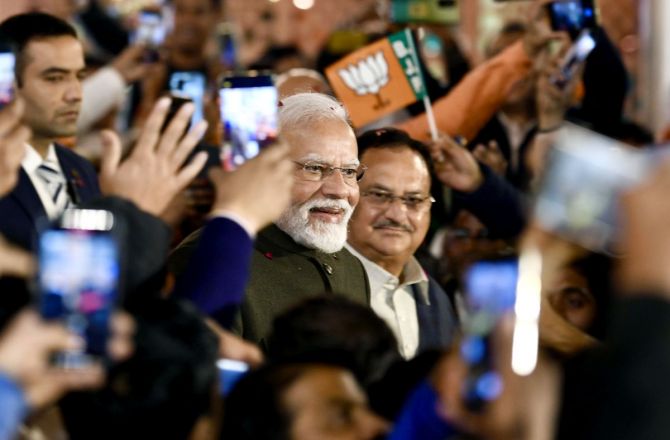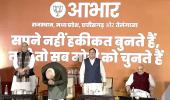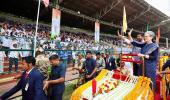Religion matters. Aspirational India is still poor. India admires strong leaders. India values decency.
Shreekant Sambrani highlights the reasons why the BJP pulled off improbable victories in the Hindi heartland.

Modi won.
Modi won, too.
Modi one two three.
That just about sums up what happened in last month's elections to five state assemblies.
Of course, that is not all what the numerous pundits said on air, on the net and in print. They had far more to say.
This writer has waited a few days before airing his reactions, savouring what others had to say in the meanwhile.
It is now almost axiomatic that the commentariat will discover some new phenomenon in the results of all major elections, even to the state assemblies, that marks a watershed in India's history.
In 2007, when the Bahujan Samaj Party won a clear majority on its own in the Uttar Pradesh assembly, winning 206 out of the 403 seats, a whopping gain of 108, we believed that Bahen Mayawati had indeed arrived.
It was a matter of time before she would shift her base to Raisina Hills and be acknowledged as India's first Dalit woman chief executive.
But she lost the 2012 state assembly election, rather badly at that, falling to 80 seats, and we promptly switched our attention to the victor, the Samajwadi Party under its young leader Akhilesh Yadav.
He had won even more handily than the BSP, with 224 seats, a gain of 127, well beyond anyone's expectations, including his father the patriarch of the party and many squabbling uncles.
Surely, it was time for the youth of the country, educated and with clean records to take charge.
Come 2017, and the Bhartiya Janata Party won an even grander victory, with a tally of 312, count 'em 312, a gain of 267!
Unheard of, we said, and yesterday's young leader Akhilesh Yadav was succeeded by an equally young Yogi Adityanath of the BJP.
We said it was lawlessness under the SP regime that led to the BJP landslide.
And when Yogi repeated his success five years later with 57 fewer seats, we said it was a victory for Hindutva, which trumped anti-incumbency and misgovernance issues.
I have narrated this history to show that what passes for election analysis in India is mostly, not all, Monday-morning quarter-backing, second guessing the voter behaviour after the fact.
The myriad opinion and exit polls are also not very different, with the added complication that the so-called psephologists do not even entertain the possibility that many a smart respondent would be giving them the answer that they would like to hear, and not the respondent's true view.
I have done far too many market surveys in my time to trust the integrity of the responses in their totality, but the growing tribe of pollsters in India seems to be suspending disbelief about what their surveyors bring in for them.
The reactions leading up to this last election and its results bore a striking resemblance to all the previous ones, so much so that I did not even have turn the television on or read the newspapers for long.
The usual culprits were all there, as were the usual forecasts, analyses and comments.

Surely, Madhya Pradesh is ripe for change, after 20 years of BJP government, 18 of them under Shivrajmama with a brief interlude of a year and some under the human lotus, they said.
The double-engine ki sarkar will be hit by a double whammy of anti-incumbency, they added for good measure.
And the Gehlot government has offered a veritable smorgasbord of freebies, how can the voters not fall for them? they wondered.
Some sceptics admitted to a possibility of a close fight, but only in sotto voce mode.
And in Chhattisgarh, the government was so pro-people that the BJP might as well give a walk over and save itself the trouble of an exhausting but fruitless campaign.
Down South, things were not looking too hot for the Telangana Rashtra Samithi, which had ambitiously promoted itself to Bharat Rashtra, a bit prematurely, surely!
In sum, this set of state elections would bode well for the new Congress leadership under an ancient warhorse and I.N.D.I.A would have plenty of dry powder left over the main battle just a few months away.
Exit polls with their usual fanfare and synthetic suspense created by holding back the numbers as long as possible, more or less confirmed what their channels already knew and had discussed to death.
One or two were brave enough to actually go beyond the pale, predicting a BJP victory in Madhya Pradesh by significant margins, thus putting at risk their 'professional' credibility.
We all know what happened on December 3. Most pollsters, including those who previously called their exit polls 'exact polls', had to eat crow.
But our analysts are a hardy bunch. Out came quick explanations: Mamaji was saved by his laadli behnas, an example of a reverse rakshabandhan relationship; Gehlot's magic hat was empty, so no rabbit came out and who can ever predict anything in the ambush-prone Chhattisgarh! But we were right about Telangana, weren't we?
And now a particularly noxious argument has been bandied about: The North-South faultline in Indian voter behaviour. First proffered by interested political hacks, it has gained a bit of traction as some otherwise respected academics have come out with their own theories.
Based on little more than cherry-picked anecdotal evidence, an untenable hypothesis stating that the BJP is unable to gain ground in major southern states because 'Without antagonism towards Muslims for the 'historical wrongs' committed by Muslim rulers in India's past and the idea of 'Muslim infidelity' to India, the BJP won't be what it is.'
It is possible to show, based on historic developments, that antagonism towards Muslims and a strong pull to the Hindutva ideology have found purchase even in some areas that did not suffer perdition under Muslim rule.
The real enigma is why this happens in Gujarat and Maharashtra, but not in Andhra and Tamil Nadu.
The North-South divide in the Indian polity is real and has been so for some time. But raising it to a faultline could add to the prevailing incendiary rhetoric.
Why does this lop-sided analysis of election results keep recurring? I believe the main reason is that we do not quite factor in four major traits of the Indian electorate.
These are part of the permanent make-up of voter' minds; they do not vary according to the circumstances of any given election.
I list these below, in diminishing order of importance.

Religion matters
I don't mean this in the form of observances of rituals, although that is part of the religious make-up.
Organised religion of any kind offers comfort and anchor to all lives, not just troubled ones.
That is why there are so few non-religious people in the world.
Many among even those who consider themselves irreligious, if not downright atheists, turn to religion when faced with adversity they find difficult to cope with.
India being four-fifths Hindu, obviously that religion matters above all.
We are deeply respectful of the scriptures, holy personages (even self-styled godmen), and above all, the pantheon of gods, as well as places of worship.
And among all the gods Hindus worship, there is none like Rama, the maryada purushottam, the paragon of all virtues.
This emotional connect is pan-Indian, there are as many southern names derived from Rama as there are in the north, as also places named after the Lord, and His temples.
A corollary to this is distrust of other religions. We have all imbibed the ancient wisdom 'swadharme nidhanam shreyam, paradharmo bhayavah' (death in one's own religion is preferred, as alien religions are dangerous).
This is true not only of Hindus but also of Muslims, Christians, Sikhs and followers of all other religions and sects as well.
A caveat: Being an adherent of Hinduism is not the same as being an acolyte of Hindutva and being distrustful of other religions is not tantamount to religious bigotry or worse, fanaticism.
A vast majority of Hindu Indians belong to the former group of these binaries.
While they may not trust Muslims, they more than tolerate their presence, not in their locality, but in the wider society.

Aspirational India is still poor
By any measure, India is still a poor country. Its per capita income may be rising and quite satisfactorily at that, but daily necessities still stretch the family budget.
Added priorities of children's education (the main means of rising above poverty) make a sizeable dent in the family resources.
That should explain why we do not see a contradiction between the government's avowed goals of making India a developed country in the next quarter of a century and its commitment to offer free food to some 60 per cent of Indians for the coming five years.
Most Indians have no support base except mai-baap sarkar in their hour of need.
Welfare measures and subsidies of various kinds have been parts of our lives for long and the only way of weaning us away from them is sustained and equitable economic growth.
That train is still coming. As we wait for it, doles have become the order of the day.
But we are now wise enough to understand that freebies are not unmitigatingly good. Someone must pay for them some time. And that someone is our own progeny.
The Indian voter welcomes gifts from the government, but not to the extent of bankrupting the treasury and burdening the future.
She does not want to borrow from her children and their children yet unborn.
She knows that political parties promising the earth as giveaway have no means to finance them.
Revdis may taste sweet, but an excess of them could cause social diabetes.
India admires strong leaders
An uncertain, fraught life is made somewhat bearable when we know someone has our back.
Apart from religion, that someone is a godman we turn to, a local benefactor, and for the society as a whole, a strong leader.
The aura of assurance and control such a person exudes induces a sense of comfort.
We will be ready to sacrifice some of the few civil liberties we enjoy as the price of protection and the feeling of well-being such a patron offers us.
An undecisive, hesitant leader is seen as conflicted and not worthy of our trust.
If leaders cannot accept challenges, how can we be sure of the safety-shield they offer us against adversities as yet unknown?

India values decency
Even though popular culture, especially as reflected in films, glorifies at times rowdy behaviour, we are mostly averse to rudeness.
Respecting elders (which includes those with authority over us) is in our genetic make-up.
Physical or verbal abuse gets taalis and sitis in cinema halls, but is abhorrent in real life.
That is especially true in heated contests, be they in political arenas or sports stadia.
We admire Virat Kohli when he emulates Sachin Tendulkar, but not when he becomes overly aggressive.
Now see the last few elections in this light.
The BJP owns the Hindutva plank, which is all right with even non-militant Hindus.
And when the party adds nationalism to it, it becomes almost irresistible. Plus the BJP now has the lock on Rama and his worship.
The 'labharthi' culture the BJP has promoted sits well with voters. It does not get into competitive populism with the opposition, which is just fine.
That the BJP does this even as the economy is seemingly humming along offers the comfort that the doles will not break the bank.
And was there ever a more confident and self-assured leader than Prime Minister Modi? Not in the memory of most voters.
He is a man born to fight elections, to boot! Goodness knows how deep his pool of reserve energy is! And he wins elections too, almost single-handedly! How can any dirt stick to him?
The last straw is motor mouth Opposition leaders. Epithets have become stronger with each election; the relatively simple and mild 'chor' is now replaced by 'liar', 'Ravana,' 'panauti' and worse.
Such escalation of abuse causes an equally rising revulsion among most voters.
It is now easy to see how the BJP under Modi ticks all the boxes that control voter behaviour. The proof of the pudding was provided on December 3.
Again, a caveat is in order: An explanation of the voter behaviour leading to certain electoral outcomes is not necessarily an endorsement of these.
But in a democracy, even a flawed one, we must abide by what the majority decides within the given rules, however much we might disagree with it.
Remember that hoary catchphrase of all election pundits: 'The people have spoken!'
A post-script:
All this explanation will not change one bit our fascination with polls, results and commentaries.
That is part of our entertainment now, and we get it free, night after night.
Don't we pine for cricket matches all the time, even when we know how they will pan out? And don't we flip the pages of a mystery to find out whodunit?
Feature Presentation: Aslam Hunani/Rediff.com











 © 2025
© 2025